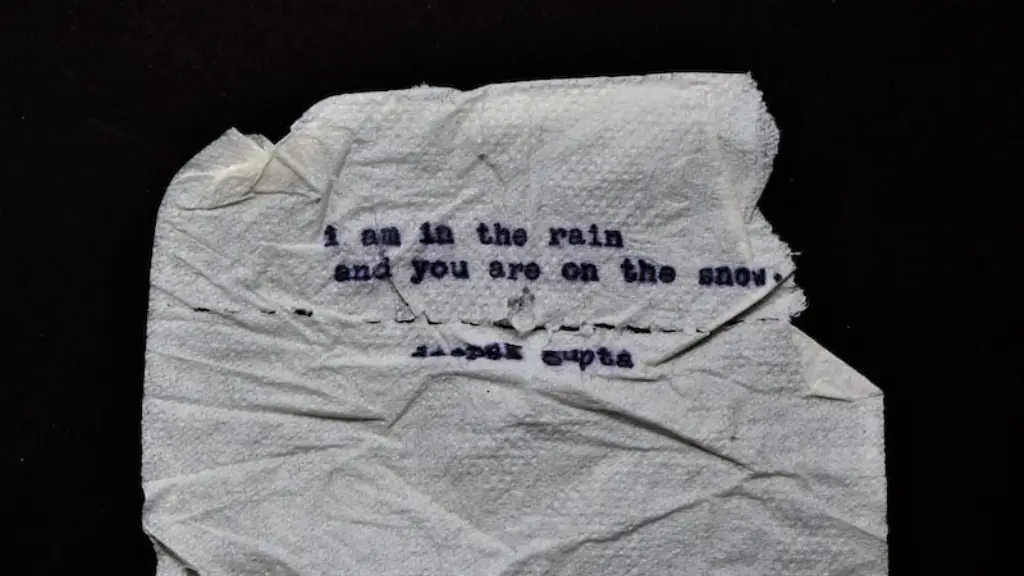Why is poetry such a difficult task for writers? To understand this, you must understand what poetry is and how it works. Poetry is an art form that requires creative expression. A poet’s words have power and evoke emotion, whether they be funny or dark, somber or joyous. Poetry is an intimate form of communication: its words are carefully crafted to convey a certain set of feelings or ideas. Its structure and rhyme schemes demand that the writer bring out their full creative potential in order to craft a poem that is both relatable and meaningful.
To write a successful poem, the writer must draw on their own experiences, emotions and reflections. This can be a daunting prospect for some writers, as it involves a heightened sense of exposure and vulnerability. Writing poetry also calls for a very specific set of skills that can be difficult to acquire. Metaphor, imagery, rhythm and word play are all aspects of a poem that must be considered and perfected if the poem is to be truly transportive and successful.
In addition to the technical complexities of writing poetry, the psyche of each unique poet can also hinder the process. Writers frequently battle with self-doubt or writer’s block, which leads to a lack of inspiration and a fear of failure. It can be intimidating to think that your words will be judged by others and not accepted.
Aside from the mental barriers, there can also be physical barriers, such as a lack of time or resources. Writing poetry requires undistracted spaces and time, away from the overstimulation of the modern world. Whether this is a study desk, a cafe or a park bench, it is essential that the space be one where the poet can let their ideas roam and come to life. This lack of resources, such as pencils, paper, and journals, can also halt the creative process.
Despite all these challenges, poetry remains one of the most enjoyable and rewarding forms of writing. By taking the time to understand the fundamentals of poetry, such as structure and rhyme, any writer can get the hang of writing a successful poem. If you are struggling to connect with your poem, take it upon yourself to read as much other poetry as possible. Doing so allows you to explore different poetic forms, gather inspiration and gain insight into how verse writing works, helping you to craft a poem that flows with energy and emotion.
The Power of Vocabulary and Imagery
The vocabulary and imagery in a poem are perhaps the most important elements of all. To engage the reader, a poem requires thought-provoking words that summon vivid pictures within the reader’s mind. It is essential to ensure that all the words chosen carry their own weight and do not just serve as fillers. Good poetry lets readers discover the writer’s musings through the power of words, so it is important to choose words that have resonance and deep connotations etched within them.
Inspiration and Creative Freedom
A major element of any successful poem is a strong source of inspiration. Writers should draw upon their own past experiences and circle of influences for inspiration, be it a personal moment or an important event in history. When writing poetry, the writer should feel free to express whatever thoughts and emotions come to mind. When faced with roadblocks in writing or feeling overwhelmed, the writer should always remember to embrace the benefits of creative freedom. For instance, a poem is an excellent opportunity to explore any subject without fear of judgement or expectations.
Process of Revising
Accounting for the technical aspects of poetry is key to crafting a timeless piece of art. After drafting a poem, a thorough revision process is essential in order to ensure that the ideas chosen are not only moving but also effectively crafted. During the revision process, it is important to check for the correct structure, flow and rhyme scheme, as well as ensuring language used is consistent with the tone of the overall work. Although it may seem tedious, this practice can only enhance the quality and value of a poem.
The Importance of Silence
Many writers forget the importance of silence in their creative process by hastily writing to fulfill a task or simply worrying about being judged. To enjoy the creative process and to build on the creative ideas generated, it is important to find a space of silence and stillness. Taking part in activities such as yoga, meditation and journaling can be great means to help express open and explore different ideas. This can help add texture and life to a poem by tapping into a specific emotion or memory.
The Benefits of Educating yourself in Poetry
Though writing poetry can be intimidating, there is a great reward in pushing oneself to take the risk and let creativity flow. Taking courses and workshops on poetry can help aspiring poets to build a better understanding of various poetic forms, as well as practice technique and gain feedback from mentors. Additionally, joining poetry reading events or workshops can help poets learn from established poets and gain inspiration from their peers whilst having fun.


